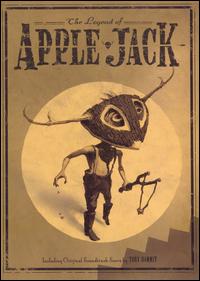Apple Jack
Apple Jack is a distilled beverage that has its roots in American history, particularly in the colonial period. It is made from apple cider through a process called distillation, which concentrates the alcohol and flavors present in the original cider. Apple Jack was historically produced through a method known as freeze distillation or "jacking," which involves freezing the cider and removing the ice, thereby concentrating the alcohol. This method is simpler than traditional distillation methods that require a still, but it can also concentrate methanol and other harmful compounds, making the product potentially dangerous if not properly managed.
History[edit | edit source]
The history of Apple Jack can be traced back to the early settlers in North America, who brought with them the knowledge of cider making from Europe. With the abundance of apples in the New World, it was a natural step to ferment the apple juice to create cider and then concentrate it into Apple Jack. This beverage became an important part of colonial life, serving not only as a source of alcohol but also as a medium of economic exchange and a staple in the colonial diet.
During the 18th and 19th centuries, Apple Jack was a common beverage in the United States, particularly in the apple-growing regions of the Northeast and Appalachia. However, its popularity waned with the rise of beer and distilled spirits like whiskey, which were easier to produce on a large scale. The production of Apple Jack also faced challenges during the Prohibition era, when the production, sale, and consumption of alcohol were banned in the United States.
Production[edit | edit source]
The traditional method of producing Apple Jack, freeze distillation, is less common today due to the health risks associated with concentrating impurities. Modern producers typically use standard distillation methods to create a cleaner and safer product. The process begins with the fermentation of apple cider, which is then distilled to increase the alcohol content and enhance the flavors. The resulting spirit can be aged in oak barrels to further develop its taste.
Cultural Significance[edit | edit source]
Apple Jack holds a special place in American cultural history as one of the country's original distilled spirits. It is often associated with the pioneering spirit of early American settlers and has been celebrated in folk songs, literature, and folklore. Despite its decline in popularity, there has been a resurgence of interest in Apple Jack in recent years, with craft distillers and enthusiasts seeking to revive traditional recipes and methods.
Regulation[edit | edit source]
In the United States, the production and sale of Apple Jack are regulated by the Alcohol and Tobacco Tax and Trade Bureau (TTB). Distillers must comply with federal regulations regarding the production, labeling, and distribution of distilled spirits. The term "Apple Jack" can be used to label products that are distilled from apple cider and meet the regulatory requirements.
See Also[edit | edit source]
Search WikiMD
Ad.Tired of being Overweight? Try W8MD's physician weight loss program.
Semaglutide (Ozempic / Wegovy and Tirzepatide (Mounjaro / Zepbound) available.
Advertise on WikiMD
|
WikiMD's Wellness Encyclopedia |
| Let Food Be Thy Medicine Medicine Thy Food - Hippocrates |
Translate this page: - East Asian
中文,
日本,
한국어,
South Asian
हिन्दी,
தமிழ்,
తెలుగు,
Urdu,
ಕನ್ನಡ,
Southeast Asian
Indonesian,
Vietnamese,
Thai,
မြန်မာဘာသာ,
বাংলা
European
español,
Deutsch,
français,
Greek,
português do Brasil,
polski,
română,
русский,
Nederlands,
norsk,
svenska,
suomi,
Italian
Middle Eastern & African
عربى,
Turkish,
Persian,
Hebrew,
Afrikaans,
isiZulu,
Kiswahili,
Other
Bulgarian,
Hungarian,
Czech,
Swedish,
മലയാളം,
मराठी,
ਪੰਜਾਬੀ,
ગુજરાતી,
Portuguese,
Ukrainian
Medical Disclaimer: WikiMD is not a substitute for professional medical advice. The information on WikiMD is provided as an information resource only, may be incorrect, outdated or misleading, and is not to be used or relied on for any diagnostic or treatment purposes. Please consult your health care provider before making any healthcare decisions or for guidance about a specific medical condition. WikiMD expressly disclaims responsibility, and shall have no liability, for any damages, loss, injury, or liability whatsoever suffered as a result of your reliance on the information contained in this site. By visiting this site you agree to the foregoing terms and conditions, which may from time to time be changed or supplemented by WikiMD. If you do not agree to the foregoing terms and conditions, you should not enter or use this site. See full disclaimer.
Credits:Most images are courtesy of Wikimedia commons, and templates, categories Wikipedia, licensed under CC BY SA or similar.
Contributors: Prab R. Tumpati, MD

